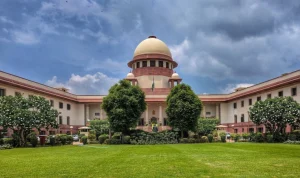Noida 09 August 2024: The Supreme Court of India has stayed the hijab ban imposed by a private college in Mumbai, allowing students to wear hijabs, burqas, and naqabs on campus. This decision comes after a plea challenging the Bombay High Court’s earlier ruling, which upheld the college’s dress code prohibiting these garments.
Background of the Case
The controversy began when N.G. Acharya and D.K. Marathe College implemented a dress code that restricted students from wearing hijabs, burqas, naqabs, stoles, caps, and badges within the college premises. The college argued that the dress code was necessary to maintain discipline and did not infringe on the fundamental rights of students. On June 26, the Bombay High Court dismissed petitions from nine female students challenging this directive, stating that the dress code aimed to ensure uniformity among students and did not violate their rights to freedom of expression or religion.
Supreme Court Hearing
During the hearing, Chief Justice D.Y. Chandrachud acknowledged the urgency of the matter, especially with unit tests approaching. The petitioners, represented by lawyer Abiha Zaidi, argued that the ban posed difficulties for students from minority communities, particularly during examination periods.
The Supreme Court’s decision to stay the ban allows students to wear their religious attire while attending classes, pending further review of the case. The court has yet to deliver a definitive ruling on the legality of such dress code mandates by educational institutions.
Implications of the Ruling
This ruling is significant as it highlights ongoing debates surrounding religious expression in educational settings. The case has drawn parallels to the hijab controversy in Karnataka, where a split verdict by the Supreme Court left the issue unresolved. Mumbai college’s decision has reignited discussions about the balance between institutional discipline and individual rights.

